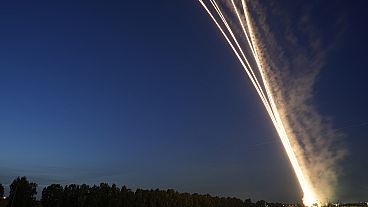By Ivana Sekularac
SKOPJE (Reuters) - Macedonia is formally expected this week to be invited by NATO to join the alliance - though it will become a member only if it adopts a new name that has been agreed in principle with NATO- member Greece but has yet to be endorsed by Macedonia's people.
The invitation to the small Balkan state to become the 30th member of the U.S.-led alliance will be issued at a NATO summit despite opposition from Russia, which sees its influence in the region diminishing, and over protests from a small pro-Russian party at home.
"For us the sun rises in the West," said Artan Grubi, a lawmaker of the Albanian DUI party which is part of the ruling coalition.
"(The invitation to join NAT0) is our dream coming true. We have been in the waiting hall for too long," he told Reuters.
He was referring to 2008 when Greece blocked an invitation to Skopje to join because of the long-running dispute over Macedonia's name. Greece says the name Macedonia implies a territorial claim over its northern province with the same name.
The then government led by a nationalist VMRO-DPMNE moved to build up closer ties with Russia, allowing an inflow of Russian capital, concretely represented today by a football club, a lead and zinc mine and a chromium plant all owned by Russians.
After a period of political crisis, the new government of Prime Minister Zoran Zaev, elected in 2017, pushed for an agreement with Greece to solve the name dispute and the two sides have now agreed on the name of Republic of North Macedonia to open the door to NATO membership.
The government has said it will hold a referendum on whether to accept Macedonia's new name so as not to face another Greek veto on membership - clearly expecting the prospect of NATO membership to be a powerful incentive for a Yes vote.
NATO diplomats said they had negotiated a wording for the invitation to be issued at the Brussels summit which will prudently avoid naming the country and will instead refer to "the government in Skopje".
OPPOSITION AT HOME
Janko Bacev who heads United Macedonia party with links to Russia's dominant United Russia says NATO membership will bring nothing good to Macedonia.
"Russia is our true ally, and it has never asked us to change the name," Bacev, whose party failed to enter the parliament in a 2016 election, said.
VMRO-DPMNE party, the single biggest party in the parliament has mixed feelings.
"We support NATO membership, but we are against changing the name (of the country)," Aleksandar Nikolovski of VMRO-DPMNE said.
The move to bring Macedonia into NATO will leave only Serbia and the Serb-run part of Bosnia open to Russian influence in the Balkans.
Albania, Croatia, Montenegro and Slovenia are NATO members while NATO forces are still in a peacekeeping mission in Kosovo.
In a sign of continuing Russian interest in the region, Serbian authorities have announced President Vladimir Putin will visit in autumn.
Russia's ambassador to Skopje has criticised Macedonia's ambitions to join NATO and warned the former Yugoslav republic that it could become "a legitimate target" if relations between NATO and Russia deteriorate further.
Macedonia will bring to NATO a 8,500-strong military which relies on a mixture of Russian, German, Greek and U.S. tanks and armoured vehicles. Its aviation has no combat jets.
"With NATO membership, Macedonia becomes a part of the most powerful Alliance. That enhances both our security and economic prosperity," Defence Minister Radmila Sekerinska told Reuters in an email.
She said she expected to "move forward with the accession treaty at the end of the year."
Foreign Minister Nikola Dimitrov said in London this week that he had "high hopes" that talks on accession should be able to start soon.
Slavco Pesov, a 66-year-old pensioner sat on a bench near the banks of the Vardar River in Skopje.
"We have to go with the flow. Our neighbours are there (in NATO)," he said. "I am really hoping membership will bring a better economic situation. At the moment it is so bad that many young people are leaving."
(Reporting by Ivana Sekularac; additional reporting by Aleksandar Vasovic in Belgrade, Kole Casule in Skopje, Daria Sito-Sucic in Sarajevo and Robin Emmott in Brussels; Editing by Richard Balmforth)


